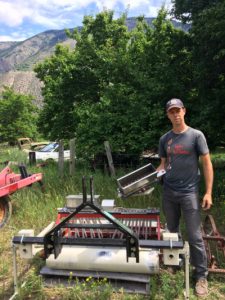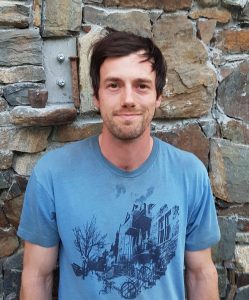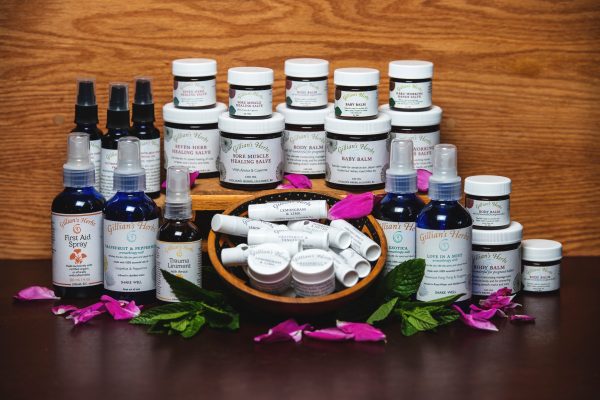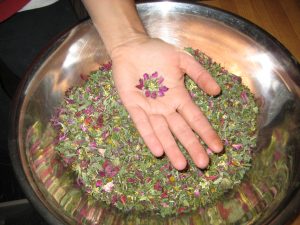 ago to farm. Green Dirt is focusing on growing salad mixes and garlic this year, and have plans to expand to other crops when they have fine-tuned the systems they have in place. I went out to Texas Creek to do a short interview with him last week.
ago to farm. Green Dirt is focusing on growing salad mixes and garlic this year, and have plans to expand to other crops when they have fine-tuned the systems they have in place. I went out to Texas Creek to do a short interview with him last week.Can you tell us a bit about yourself and your family?
“Can you answer that one?” Here’s what I can tell you: Immian was working for Silver Hills as VP Plant Operations, when he decided to move back to Lillooet, where he grew up. He says a big part of moving back was because the people are friendly here, and he missed his family and the area. Immian and his lovely wife Kymbreelee have four children: Arycia, Riella, Isaiah and Ellie. They moved from the coast with plans to enjoy a more relaxed, outdoor, farming lifestyle, and raise their children in the country.
Can you tell us a about your farming practices?
Veganic growing practices mean that Green Dirt does not use any kind of animal inputs in the growing process. One of the biggest challenges is weeds. Stale bedding allows for planting with very minimal weeds. This technique involves targeting weed seeds in the shallow layer of the soil. They are allowed germinate, and then killed by raking through the soil with a shallow cultivator just prior to planting the crop. During the sixteen-week long season, we are planting twice a week to keep up with the demand. It is possible that we may have to switch to 4 or 5 plantings a week for tighter management of leaf size but for now, two is making the cut!
When did you get involved with LAFS and why?
Right away – I was on the Area B Agricultural Committee. When the Agricultural Plan was completed, the SLRD was looking for an organization to implement the Ag Plan and LAFS was created.
Where are your products sold?
Green Dirt Farms salad mixes currently come in Baby Spinach, Baby Arugula, Power Salad Mix, Baby Kale, Lettuce and Spring Mix. They are available in Nature’s Fare, Choices, Spud/Urban Fare, Quality Foods, Buy Low, Nester’s, and the Country Store, and select independent retailers.
What are your plans for the future?
My vision for the future is all about seeing the farm provide for our little family so we can continue to love and work in this amazing area. Over the next couple of years, I intend to get all of the acres we have leased and available into production. Right now the farm is actively using 14 acres of the 24.
As I leave, Immian laughs, “Most people work 9-5, farmers work 5-9, and sometimes a little bit more. With the seasonal nature of only being able to grow things for half the year, you have to work hard during that time.”
 LAFS has accomplished a great deal in the short time since it grew out of the efforts of the SLRD’s Agricultural Area Committee. Already it has identified and received grant funding from a number of sources and used it to deliver workshops providing useful instruction for both farmers and non-farmers. As well, LAFS has begun developing a “face” for the Lillooet agricultural area, and started to implement projects such as the nutritional coupon program and the abattoir feasibility study that will help not only the farmers in our area but its residents as well.
LAFS has accomplished a great deal in the short time since it grew out of the efforts of the SLRD’s Agricultural Area Committee. Already it has identified and received grant funding from a number of sources and used it to deliver workshops providing useful instruction for both farmers and non-farmers. As well, LAFS has begun developing a “face” for the Lillooet agricultural area, and started to implement projects such as the nutritional coupon program and the abattoir feasibility study that will help not only the farmers in our area but its residents as well. Marianne Gagnon in the coming months, and look forward to meeting those of you whom I haven’t yet!
I moved to Lillooet this March, from the coast where I was working most recently for Emergency Management British Columbia. I have spent the last six years there, five of them studying Sustainable Agriculture at UBC in Vancouver. My degree is a Bachelor of Science in Global Resource Systems which falls under what is now the Faculty of Land and Food Systems (and used to be the Faculty of Agricultural Sciences/Faculty of Agriculture).
I grew up on a farm in the Shuswap, where my Mum bred and raised Welsh Cobs. We did our own hay, and always had neighbours with fresh eggs and veggies for us.
I am very excited to be a part of the LAFS community, and to be working towards a vision of a strong agricultural future for the Lillooet region. I do think that Guaranteed Rugged or not, we’re definitely BC’s little nugget.
Marianne Gagnon in the coming months, and look forward to meeting those of you whom I haven’t yet!
I moved to Lillooet this March, from the coast where I was working most recently for Emergency Management British Columbia. I have spent the last six years there, five of them studying Sustainable Agriculture at UBC in Vancouver. My degree is a Bachelor of Science in Global Resource Systems which falls under what is now the Faculty of Land and Food Systems (and used to be the Faculty of Agricultural Sciences/Faculty of Agriculture).
I grew up on a farm in the Shuswap, where my Mum bred and raised Welsh Cobs. We did our own hay, and always had neighbours with fresh eggs and veggies for us.
I am very excited to be a part of the LAFS community, and to be working towards a vision of a strong agricultural future for the Lillooet region. I do think that Guaranteed Rugged or not, we’re definitely BC’s little nugget. 




 In the recent past, Amlec Organic packaged garlic they’d purchased from two local farmers into mesh bags containing three heads each. Lillooet Buy-Low Foods then bought the packaged garlic from Amlec. This is an example of growers coming together to collectively market their produce. Sheridan said the product was popular and encourages others to follow suit.
Proper packaging is a key part to taking advantage of this opportunity. “Produce needs to be packed into clean boxes of consistent dimensions”, Sheridan said. Small-scale farmers often use recycled boxes of mismatched dimensions and this makes it harder to distribute their produce.
If you have any more questions about working with Buy-Low Foods to get your produce into stores, Bob Sheridan is happy to help.
In the recent past, Amlec Organic packaged garlic they’d purchased from two local farmers into mesh bags containing three heads each. Lillooet Buy-Low Foods then bought the packaged garlic from Amlec. This is an example of growers coming together to collectively market their produce. Sheridan said the product was popular and encourages others to follow suit.
Proper packaging is a key part to taking advantage of this opportunity. “Produce needs to be packed into clean boxes of consistent dimensions”, Sheridan said. Small-scale farmers often use recycled boxes of mismatched dimensions and this makes it harder to distribute their produce.
If you have any more questions about working with Buy-Low Foods to get your produce into stores, Bob Sheridan is happy to help.



 Q: What is your business and what do you grow for it?
A: Gillian’s Herbs is almost exclusively a one woman run business that produces small batch, high quality herbal products ranging from medicinal tinctures, tea blends, skin care products, aromatherapy products and herbal condiments for the dining table. I grow the vast majority of the herbs for the products and, at last count, my plant list was at 44 species. I also wildcraft many herbs from around the area and delight in the knowledge that if my timing is off for harvesting a plant at one elevation, there’s a good chance that it’s available just “up the road” at a higher elevation! I am deeply grateful for the gift that plants provide, and am humbled in the knowledge that the ancestors of this land and lands throughout the earth are watching and lending their wisdom as I harvest.
Q: Can you tell us about your farming practices?
Q: What is your business and what do you grow for it?
A: Gillian’s Herbs is almost exclusively a one woman run business that produces small batch, high quality herbal products ranging from medicinal tinctures, tea blends, skin care products, aromatherapy products and herbal condiments for the dining table. I grow the vast majority of the herbs for the products and, at last count, my plant list was at 44 species. I also wildcraft many herbs from around the area and delight in the knowledge that if my timing is off for harvesting a plant at one elevation, there’s a good chance that it’s available just “up the road” at a higher elevation! I am deeply grateful for the gift that plants provide, and am humbled in the knowledge that the ancestors of this land and lands throughout the earth are watching and lending their wisdom as I harvest.
Q: Can you tell us about your farming practices?
 A: We only use organic growing practices married with a sprinkling of permaculture methods. I received a certificate in Permaculture Design right here in Lillooet under the tutelage of Alice Kidd. When wildcrafting, I am strict in using ecological and ethical values when choosing where, when and how much to harvest – away from roads, power lines, train tracks to avoid dust and pollution; only harvest a maximum of 40% of the plants in a given area to leave behind enough for wildlife, pollinators, genetic material; harvest at the right time to get the best quality medicine as well as for when it’s right for that species, and so on.
Q: What is the best way to purchase your products?
A: We only use organic growing practices married with a sprinkling of permaculture methods. I received a certificate in Permaculture Design right here in Lillooet under the tutelage of Alice Kidd. When wildcrafting, I am strict in using ecological and ethical values when choosing where, when and how much to harvest – away from roads, power lines, train tracks to avoid dust and pollution; only harvest a maximum of 40% of the plants in a given area to leave behind enough for wildlife, pollinators, genetic material; harvest at the right time to get the best quality medicine as well as for when it’s right for that species, and so on.
Q: What is the best way to purchase your products?
 A: Currently, my website provides a good catalogue of my products and contacting me directly is the best way to purchase my products. Creative Haven on Main Street in Lillooet also carries many of my products. I’d love to see a permanent Farmer’s Market storefront in town set up soon! I’m game to “man” the shop if the opportunity ever comes!
A: Currently, my website provides a good catalogue of my products and contacting me directly is the best way to purchase my products. Creative Haven on Main Street in Lillooet also carries many of my products. I’d love to see a permanent Farmer’s Market storefront in town set up soon! I’m game to “man” the shop if the opportunity ever comes!
 LAFS would like to welcome its new Executive Director, Angela Bissat. Angela was born in Flint, Michigan and raised in Davison, Michigan. She first moved to Lillooet in 1983 and lived here for 15 years before moving away to Phoenix in 1998. She has now been back in Lillooet since 2008 and operates the consulting and grant writing business Al-I Initiatives.
Angela is the mother of three sons, and has one granddaughter. She has a Bachelor of Science degree with dual majors in Management & Business Administration from University of Phoenix. She obtained her Bachelor’s degree at age 42 while a single mom to 3 teenage boys.
Since returning to Lillooet, Angela has been involved with many initiatives in Lillooet including the Chamber of Commerce, the Rowing Club and, more recently, the Wildfire Recovery Assistance Program. “I like to see things grow and develop.” Angela explained. “In my case, it isn’t produce or livestock, but the business of agriculture, tourism, etc. It’s exciting to see a new project brought forth from an idea through the development process. In a way it’s similar to raising kids! I’m so proud when the project is ‘grown’ and on its own.”
Bissat has experience in the travel and tourism industry, in logistics, sales, management and business development. She loves to travel, camp and hike, and is a big Detroit Lions and University of Michigan football fan.
Angela has already proved herself to be a great addition to the team. LAFS is lucky to have her!
LAFS would like to welcome its new Executive Director, Angela Bissat. Angela was born in Flint, Michigan and raised in Davison, Michigan. She first moved to Lillooet in 1983 and lived here for 15 years before moving away to Phoenix in 1998. She has now been back in Lillooet since 2008 and operates the consulting and grant writing business Al-I Initiatives.
Angela is the mother of three sons, and has one granddaughter. She has a Bachelor of Science degree with dual majors in Management & Business Administration from University of Phoenix. She obtained her Bachelor’s degree at age 42 while a single mom to 3 teenage boys.
Since returning to Lillooet, Angela has been involved with many initiatives in Lillooet including the Chamber of Commerce, the Rowing Club and, more recently, the Wildfire Recovery Assistance Program. “I like to see things grow and develop.” Angela explained. “In my case, it isn’t produce or livestock, but the business of agriculture, tourism, etc. It’s exciting to see a new project brought forth from an idea through the development process. In a way it’s similar to raising kids! I’m so proud when the project is ‘grown’ and on its own.”
Bissat has experience in the travel and tourism industry, in logistics, sales, management and business development. She loves to travel, camp and hike, and is a big Detroit Lions and University of Michigan football fan.
Angela has already proved herself to be a great addition to the team. LAFS is lucky to have her!  There is strong interest from local producers to research the opportunities and barriers to establishing an abattoir and related businesses. Producers want to decrease their travel time to licensed facilities. Currently, they must travel approximately 140 kilometres each way. The study will include recommendations on the type of abattoir that would be best suited for our region and possible locations (if location is permanent). Partnerships, training and value-added products will also be researched.
A Request for Proposal has been developed and will be distributed in early February.
Stay tuned for more updates!
There is strong interest from local producers to research the opportunities and barriers to establishing an abattoir and related businesses. Producers want to decrease their travel time to licensed facilities. Currently, they must travel approximately 140 kilometres each way. The study will include recommendations on the type of abattoir that would be best suited for our region and possible locations (if location is permanent). Partnerships, training and value-added products will also be researched.
A Request for Proposal has been developed and will be distributed in early February.
Stay tuned for more updates!
 Photo Credit: Spray Creek Ranch
Photo Credit: Spray Creek Ranch 
